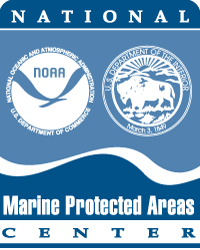A Cultural Landscape Approach
A Resource by the Marine Protected Areas Federal Advisory Committee (These statements do not necessarily reflect the positions of NOAA or the U.S. Government)

One Place – Many Values

Often, sites selected as MPAs have been important to people for decades, centuries, or even millennia. The biological richness or other location attributes made them essential to different cultures and many stakeholder groups. Cultural heritage resources reflect long-standing and contemporary human connections and uses of marine areas. In revealing our common dependence on marine places, cultural heritage also reveals individual connections to specific cultures, peoples, and spaces. The integration of cultural and natural heritage creates opportunities to recognize and value cultural and social differences, while embracing a broad shared vision of stewardship for the marine environment.
Meeting Obligations
Identifying and protecting particular kinds of cultural resources is a legal obligation as well as an agency mandate. Meeting these obligations depends on many factors and is subject to different interpretations by individuals, organizations, and courts. The managers of MPAs are the front line stewards for special places held in trust for the public good. Charged with maximizing the protective and social benefits of MPAs, managers of marine cultural and natural heritage resources deal with complex technical, ethical, and moral questions and challenges.
Creating Opportunities
Integrating cultural heritage provides dynamic opportunities for improving MPA outcomes. The Cultural Landscape Approach that provides the ethical and intellectual foundations for this toolkit offers fundamental principles that can guide MPA planning and management throughout the United States and its protectorate areas. Cultural heritage provides a well-tested means for expanding community engagement. Using a Cultural Landscape Approach to link biophysical science with historical, ethnohistorical, ethnographic, archaeological, place-based traditional and stakeholder knowledge and insights offers a clear path toward successful ecosystem-based management and broad-based community stewardship.
An Evolving Discipline
Despite origins that date back to the 1970s, the field of Maritime Cultural Landscapes is still an emerging one. Maritime Cultural Landscapes effectively apply the CLA to marine environments and maritime cultures.
Understand What are cultural resources?
Read more about a Cultural Landscape Approach in the National MPA System.
Read more about a Maritime Cultural Landscape approach.
 Marine Protected Areas
Marine Protected Areas